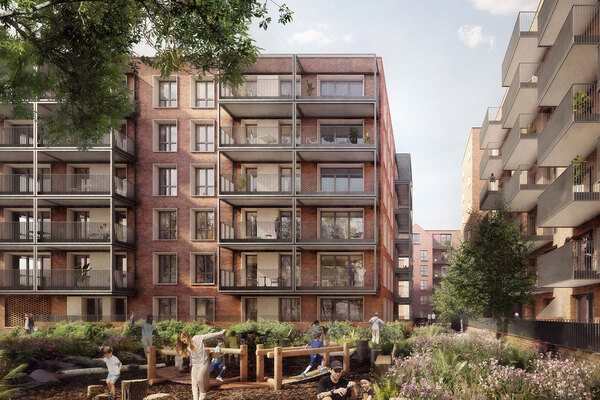Jersey housing minister’s plans to take on the island’s powerful private interests with proposed tenancy reforms
Jersey housing minister David Warr has vowed to take on the powerful interests in the island’s housing sector and push through legislation that aims to cap rent increases and introduce open-ended tenancies. He speaks to Stephen Delahunty about his plans
In an interview with Inside Housing, David Warr admits that tenants have not always been treated fairly in Jersey, as he sets out proposed reforms to the island’s rental law.
He says: “We have very powerful [landlords] who have got very strong views about how the rents are set here. But I was at a town hall meeting recently, where a landlord had not announced they were putting their rents up and then gave just three weeks’ notice to their tenants.
“On the one hand, these associations present as caring about the community, but there’s a money-making exercise going on as well.”
Mr Warr adds that some of the stories he has had heard about landlords on the island made him “wake up” to some of the poorer practices of some landlords that can leave some people in precarious situations who are also frightened to complain.
“We have this weird rule in Jersey where if you’re living or working on the island for between one to five years, then you have to through what we call ‘the unqualified sector’, [which] is notorious because there’s a limited amount of accommodation and rents can be high.
“So what happens is you have immigrants living three or four people to a room because they can’t afford the rent, who won’t complain about their conditions because they’re scared to put their head above the parapet,” he explains.
Mr Warr says he had spoken to a landlord about what he described as “revenge” or no-fault evictions and he was challenged by the landlord to provide any evidence that one had taken place.
“It’s a psychological thing, it’s going to be hard to prove, but it’s just about acknowledging that there has to be better conditions for tenants across the board,” Mr Warr states.
Residential tenancies exist across different tenure types in Jersey. These include social rent, qualified private rental, non-qualified private rental (excluding lodgers and boarders in private households), and staff, service or tied accommodation.
There has been continued growth in Jersey’s housing market, with a growing population and changes to overall household compositions driving a need for more homes.
The rental market on the island has seen an overall growth of nearly 1,700 additional households.
The 2021 Census showed that the number of households in qualified private rental increased by almost two-fifths (38%) over the 10-year period. Households occupying other non-qualified accommodation decreased by over two-fifths (42%) and there was a 14% decrease for households in staff, service or tied accommodation.
The number of households in social housing in Jersey has grown only 3% between 2011 and 2021 to around 6,000 households. There are only five social landlords on the island, but some parishes also provide forms of social housing, particularly sheltered living accommodation.
As part of his plans, Mr Warr will work with the parishes to consider whether they should be regarded as providers, considering the nature of the homes they provide and their plans to provide more homes.
The social housing waiting list in Jersey is called the Affordable Housing Gateway. An issue that Mr Warr wants to address is that a person is not allowed on the gateway if their income level is above a certain size. They also have to be over 45.
“It doesn’t help young people to get on the ladder. So I want to open up that gateway to a higher income threshold and anybody 25 and over,” he states.
Another issue with the waiting list is the use of data. Mr Warr explains that one provider, Andium Homes, has its own list, which has around 2,000 applicants, and the 12 parishes each have their own list, which the government has no access to due to GDPR rules.
“So one of the challenges is having good valid data because you could end up in a situation where you have one person on every list,” he says.
Mr Warr explains that under previous governments, former ministers had made various commitments to review and introduce new legislation relating to residential tenancy matters in Jersey.
This included progressing updates to the Residential Tenancy (Jersey) Law 2011, re-establishing the island’s Rent Control Tribunal and introducing a social housing regulator.
“But in 2023, it is very clear that not enough progress has been made over the past decade,” states Mr Warr.
Earlier this year, Mr Warr published a government white paper setting out how he wants to overhaul the rental market to offer more rights and better protections for tenants living in rented homes.
He plans to introduce open-ended tenancies, in the hope it will reassure tenants they will not be evicted at short notice. If approved, landlords will have to give tenants at least two months’ notice to put up rents, and it can only be put up once a year.
A new Housing Tribunal service will also be created to mediate in residential disputes.
Mr Warr also intends to formalise requirements for social housing provision on the island, which will include introducing a definition of a ‘social housing provider’, alongside creating a route for new organisations to become recognised social housing providers.
He also hopes to increase the scope of regulation and order-making powers to make sure the law can be extended further and remains fit for purpose for the years ahead. Jersey used to manage its own housing stock up until around 2011-12, then it was transferred to an ALMO, in a similar way to the UK model.
“When the government had it, no one was investing enough in the housing stock, it was just a political football,” explains Mr Warr.
The minister’s plans for the island also include looking at how the 900 or so empty homes on the island can be brought back into use and a new build program that aims to deliver around 3,000 new homes by 2030.
Ultimately, Mr Warr says he hopes his plans would make this system in Jersey more efficient and less bureaucratic.
He adds: “We have to be honest with ourselves and acknowledge that 95% of landlords do a decent job, and they’re the ones that are hacked off with the suggestions of poor behaviour or criminal elements.
“But it’s the small percent who cause the most grief and leave tenants in difficult positions with no access to redress and advice, so we need a tribunal service that is much more accessible to people.”
Mr Warr’s proposals for the Residential Tenancy Law went out for public consultation between April and June. The feedback is now being assessed and will be published in due course alongside any planned changes to his proposals.
Sign up for our daily newsletter
Already have an account? Click here to manage your newsletters













